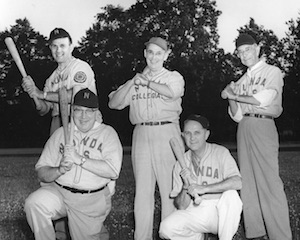Kennedy, Michael J "Doc"
Michael J. “Doc” Kennedy never lived in Nunda but was well known here, both as a professional baseball player and as a local farmer in nearby Chautauqua Hollow. Since he is buried in Nunda’s Oakwood Cemetery, he can be included in our local sport’s history. local sport’s history.
Born in Brooklyn in 1856 to Irish immigrants, Kennedy began his baseball career as a catcher for a Memphis club in 1876. The next year he was in Rochester, where he played a season and a half for the “Hop Bitters.” It was then that he was tagged with the nickname that was to stay with him for the rest of his life. The story goes that when Kennedy came to bat in a tight game against a New Bedford team, a fan shouted out “Say, Doctor, give them fellows out in the field a little of the ‘Favorite Remedy’ of yours.” Kennedy hit a homer and from that time on was known as “Doc” Kennedy. Kennedy left Rochester to sign with the Cleveland Blues of the National League, playing his first major league game on May 1st, 1879, in Cleveland. Doc was a popular player and a good hitter, often bringing in the deciding runs for the Blues. In those early days catchers didn’t use catcher mitts or have protective equipment. In fact, Doc never wore a baseball glove anytime during his long career.
In the summer of 1883, Doc severely injured his right arm in a game against Chicago. No longer able to catch, he was released by the Blues. He quickly taught himself to throw with his left arm and played out the season at first base with another National League team, the Buffalo Bisons. Although he was never able to throw from first to third, his fine fielding and solid batting kept him in the lineup.
Over the next decades, Doc Kennedy contributed to a number of teams in a variety of leagues. Among his teams were those from Elmira, Flushing, Fall River (Massachusetts), Canandaigua, and Albany. He even had return stints with Cleveland, Buffalo, and Rochester. According to newspaper accounts, he was a “great favorite with spectators and players.” The Rochester Democrat and Chronicle of May 13, 1891 stated “There is only one “Doc” Kennedy, and he is an ornament to the diamond, for he is a gentleman on and off it.”
Michael had married a Cohocton girl, Olive Whiting, in 1878. In the 1880 Federal Census they are listed as living with Olive’s parents in Cohocton. This was probably a good arrangement since their first child, John, had been born in 1879 and Michael was playing with Cleveland and on the road through much of the baseball season. Eventually they had three more children: Grace in 1882, Albert in 1885 and Raymond in 1900. By the time Raymond came, along Doc had semi-retired to a farm in Chautauqua Hollow. Traveling was in his blood, however, and he spent several years as a traveling salesman for the Buffalo Cigar Company while Albert and Raymond worked the farm. John, following in his father’s footsteps, had also become a professional baseball player.
When Kennedy died on May 23, 1920, at age 64, newspapers throughout the country carried the news of his passing, paying tribute to his contributions to the early years of the sport he loved so much. Although the family farm was close to Swains, his widow Olive purchased several burial lots in Nunda’s Oakwood Cemetery, probably because their daughter, Grace Kennedy Scholes, lived just south of the village at the time. There is no mention of baseball on the small granite marker that marks the spot. But true fans of 19th century baseball will not forget that the noted catcher and first baseman Michael “Doc” Kennedy sleeps here in Nunda.
|

